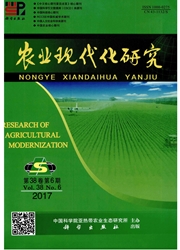

 中文摘要:
中文摘要:
气候变化背景下中国玉米稳产的农业适应性策略研究,对于确保粮食安全和优化农业资源配置具有重要的现实意义。本文以玉米为例,对中国农业生产是否"靠天吃饭"这个老话题给予了一种新的检验。通过2004-2014年玉米主产区12个省(自治区)166个地级市(区、盟、自治州)的统计数据,研究发现玉米种质创新和灌溉条件改善作为减缓气候变化不利影响的适应性策略对稳定玉米产量具有重要的促进作用,而干旱对玉米单位面积产量具有显著负向影响。基于玉米种质创新、灌溉条件和干旱指数的联合检验结果表明,2004-2014年中国玉米生产"靠天吃饭"的局面已有所改观。然而,支撑玉米有效应对干旱的灌溉手段是不断扩张的机井数量,这对于农业灌溉水资源短缺的华北和西北地区,过度开采地下水资源,将加重粮食生产的生态环境脆弱性和安全性风险。"十三五"时期,在平衡粮食生产和环境资源的双目标时,有必要缩减农业灌溉水资源负荷过重地区的粮食生产任务,并就这一问题给予相关的科研论证。
 英文摘要:
英文摘要:
It is of great importance for China's grain security and the efficient utilization of agricultural resources to study the adaptive agricultural strategy for corn production under the background of climate change.Based on the data of corn production in 166 cities from 12 main corn producing provinces from 2004 to 2014,this paper examined the classical question about whether China's grain production is still relying on nature.Results show that corn breeding innovation and improved irrigation have significant positive effects on reducing the dependence of corn production on nature.While drought has a significant negative impact on corn yields.In addition,joint test also shows that the situation of China's corn production relying on nature has been improved from 2004 to 2014.But irrigation expansion relies on the increase of the number of wells,which will result in the over-exploitation of groundwater and the increased ecological and environmental concerns.During the thirteenth Five-year Plan period,to balance the objectives of future food production and the environmental resources,this paper suggests to reduce food production task from the regions requiring heavy irrigation and to conduct more related scientific research for this problem.
 同期刊论文项目
同期刊论文项目
 同项目期刊论文
同项目期刊论文
 期刊信息
期刊信息
